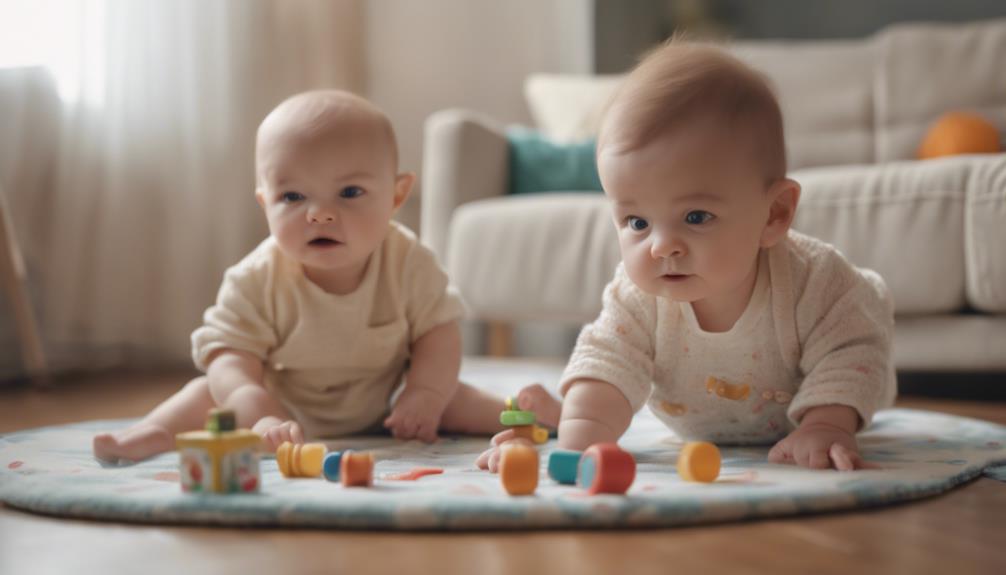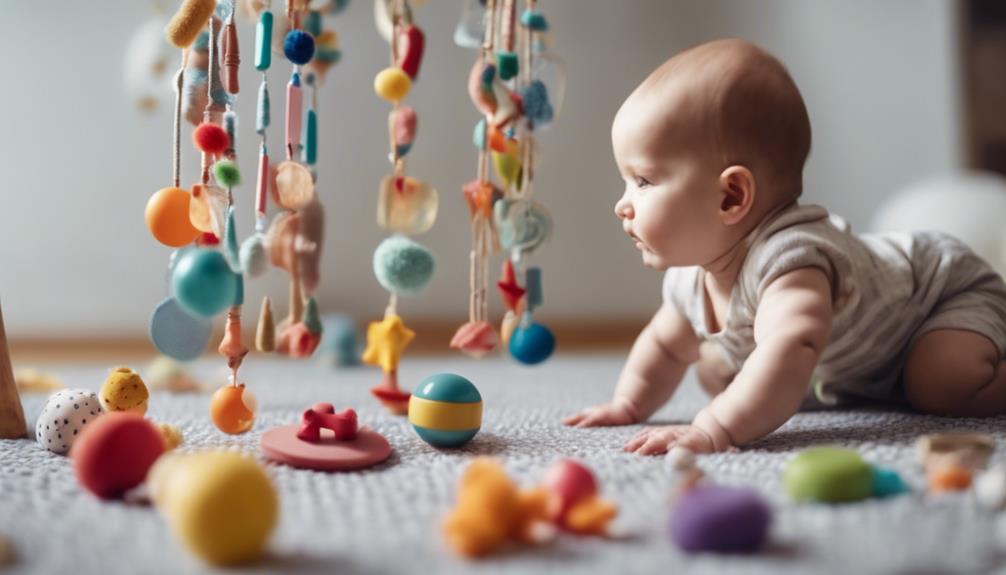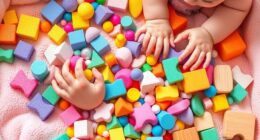At 6 months old, your baby begins developing social preferences and forming attachments to familiar faces. They display joy, respond to emotions, and enjoy simple games like peek-a-boo. Recognizing themselves in a mirror could be a sign of early self-awareness. Establishing secure bonds with caregivers is essential. It is common for separation anxiety to occur, which may result in seeking comfort behaviors. Responding with a soothing tone can help calm them. Engaging in activities such as peek-a-boo can enhance their social skills. Recognizing loved ones aids in building trust. Social smiles and gestures indicate growth in communication. By encouraging interactions, you are effectively supporting their social development. Witnessing their progress is truly fascinating!
Key Takeaways
- 6-month-olds form attachments and show social preferences.
- Separation anxiety may lead to comfort-seeking behaviors.
- Babies respond to emotional cues, displaying self-soothing behaviors.
- Interactive activities like peek-a-boo foster social skills.
- Recognizing familiar faces and social smiles are crucial for social development.
Social Preferences and Attachment
At 6 months old, your baby begins to show social preferences and form attachments with familiar faces. These are important developmental milestones that indicate your baby is starting to recognize and connect with the people around them.
During this time, your little one may show emotional milestones by displaying positive emotions like happiness and responding to the emotions of others. They may enjoy playing simple games like peek-a-boo, especially with family members. Additionally, babies at this age might start to recognize themselves in a mirror, showing signs of self-awareness.
Building secure attachments with caregivers is essential for healthy social development in infants. Encouraging these early bonds can help your baby feel safe and secure, laying the foundation for positive relationships in the future.
Separation Anxiety and Comfort Seeking

During the sixth month, babies may display separation anxiety, seeking comfort from familiar caregivers when distressed. This anxiety stems from the growing recognition of primary caregivers and can lead to behaviors like thumb-sucking or turning away.
When separated, babies may show signs of distress, such as crying or clinginess, as they seek security and reassurance from those they trust. Responding to their emotional cues, like using a soothing tone of voice, can help calm them during these episodes.
Establishing predictable routines and leaving the baby with reliable caregivers can also aid in managing separation anxiety. It's essential to provide a safe and comforting environment for the baby to navigate these feelings of distress and insecurity.
Emotional Cue Responsiveness
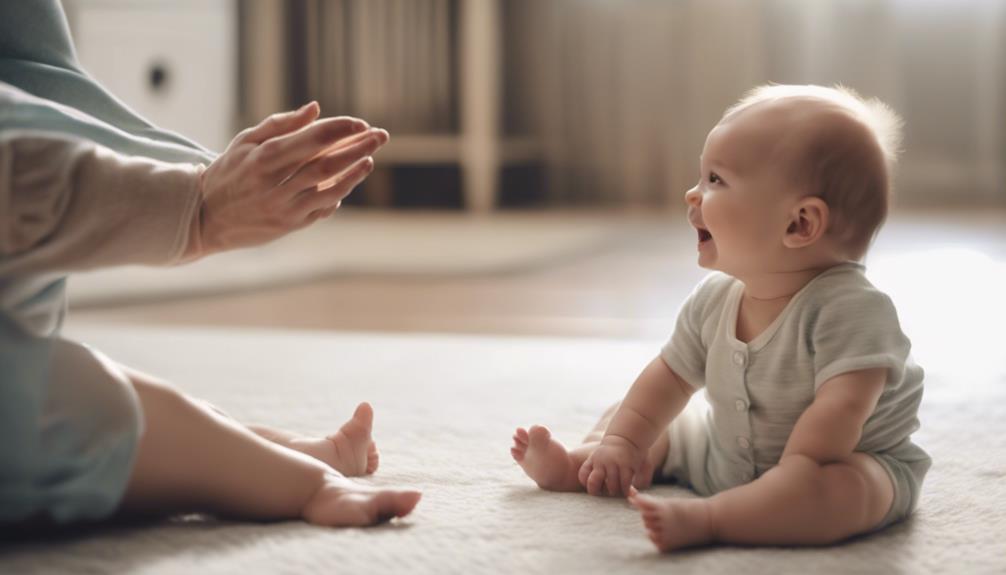
Responsive to emotional cues, a 6-month-old baby displays early self-soothing behaviors when seeking comfort from caregivers. At this stage of development, emotional cue responsiveness plays a vital role in the baby's interactions and bonding experiences.
Here are some key emotional development milestones you may observe in your little one:
- The baby reacts to your tone of voice and emotions, indicating an increasing awareness of emotional signals.
- They may use self-soothing techniques like turning away or sucking their thumb when distressed, showcasing early attempts to regulate their emotions.
- Expressing feelings through sounds, facial expressions, and body language becomes more pronounced, allowing the baby to convey their emotional state effectively.
Understanding and responding to these emotional cues not only fosters a strong bond and sense of security but also supports the baby's overall emotional development. By acknowledging and validating their emotions, you're helping them navigate their feelings in a healthy and secure manner.
Interactive Activities for Social Development
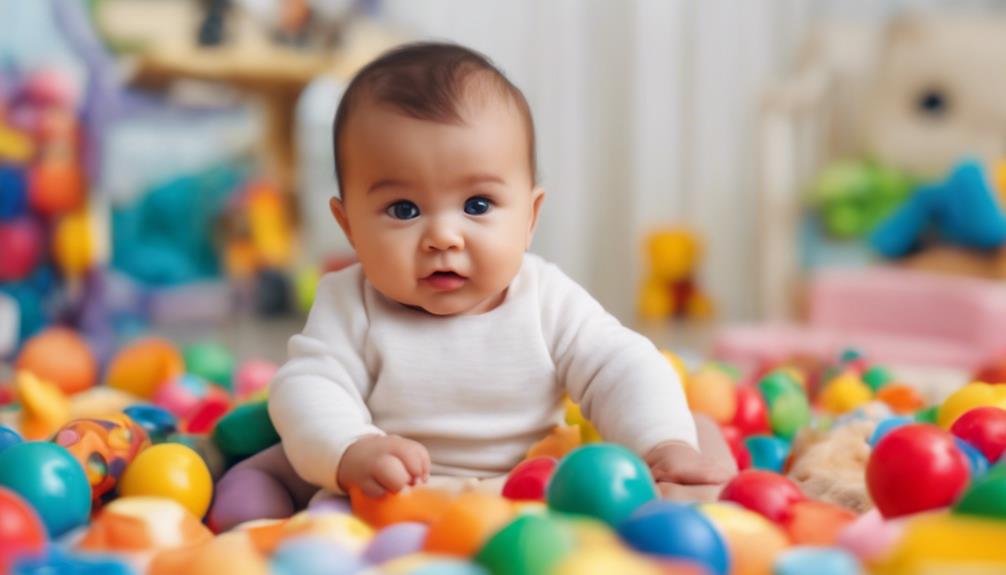
Engaging in interactive activities such as peek-a-boo and patty-cake can foster social skills in your 6-month-old. These playful interactions encourage turn-taking and imitation, laying the foundation for healthy social development.
Through simple games and shared experiences, you aren't only bonding with your baby but also nurturing their ability to engage with others.
Playtime for Bonding
To enhance bonding and promote social development with your 6-month-old baby, engaging in interactive activities during playtime is vital. Playtime serves as an essential opportunity to strengthen the connection between you and your baby while aiding in their social development.
Here are some interactive activities that can help foster this bond:
- Singing nursery rhymes or lullabies can create a soothing and comforting environment for your baby, promoting a sense of security and closeness.
- Playing simple games like peek-a-boo not only brings joy and laughter but also encourages eye contact and social interaction, strengthening the bond between you and your little one.
- Engaging in back and forth play, such as imitating your baby's sounds or gestures, can help enhance their communication skills and promote social engagement.
Peek-A-Boo Fun
Playing peek-a-boo with your 6-month-old baby can be a delightful and beneficial way to enhance their social development. This classic game not only brings joy but also aids in your child's cognitive and emotional growth. Through peek-a-boo, your baby learns about object permanence, understanding that things still exist even when out of sight. This newfound knowledge contributes to their overall development by sharpening memory and attention skills.
Moreover, engaging in peek-a-boo fosters bonding between you and your child, strengthening the parent-child relationship. The game encourages turn-taking and communication as your baby anticipates and reacts to the surprise element, promoting social interaction.
Recognizing Familiar Faces

At 6 months old, your baby can distinguish familiar faces and strangers, showing preference for those they recognize. They may respond to smiles, seek eye contact, and showcase social smiles when interacting with familiar faces.
Recognizing loved ones helps your baby build trust and security in relationships, promoting healthy social development.
Responding to Smiles
Recognizing familiar faces, your 6-month-old baby may show excitement and joy through smiles. This response to familiar faces is a significant milestone in social development. Here are a few emotional cues to look out for in your baby's reactions:
- Their eyes light up, and they may let out a happy coo at the sight of a loved one.
- A big, toothless grin spreads across their face, showing their delight in recognizing someone familiar.
- They might kick their legs and wave their arms in excitement, displaying their joy and connection to the person they recognize.
These reactions not only indicate your baby's growing ability to distinguish between familiar and unfamiliar faces but also signify the importance of social interactions in their emotional development.
Encouraging these positive responses through smiles and interactions with familiar faces can help nurture your baby's social skills and strengthen their emotional well-being.
Seeking Eye Contact
By 6 months old, your baby begins actively seeking eye contact as a means of recognizing familiar faces and establishing social connections. This milestone marks an important step in your baby's Social and Emotional development.
Seeking eye contact allows your little one to identify and bond with loved ones, such as caregivers and family members. The interest your baby shows in making eye contact signifies a growing awareness of social interactions and a desire to connect with those around them.
When your baby gazes into familiar faces, they display recognition and comfort, building trust and security in their relationships. This act of seeking eye contact is a clear sign of developing social skills and emotional bonds.
Encourage and embrace these moments of connection as they play a crucial role in your baby's developing understanding of the world and their place within it.
Showcasing Social Smiles
Showcasing their developing emotional connections, 6-month-old babies display social smiles when encountering familiar faces. This milestone signifies their growing ability to recognize and engage with loved ones, forming essential bonds for social development.
When your baby flashes a bright smile upon seeing you, it's a heartwarming moment that highlights their increasing awareness of relationships and emotions.
Witnessing your little one's joy as they interact with familiar faces can be incredibly rewarding.
The genuine happiness reflected in your baby's social smiles can melt your heart and strengthen your connection.
Seeing your baby's excitement and positivity during these interactions is a confirmation of their budding social skills and emotional growth.
As your baby continues to make sounds and respond to stimuli, these social smiles become a crucial part of their communication repertoire. Encouraging these interactions and celebrating these moments can foster a nurturing environment for your baby's social development.
Expressing Emotions Through Gestures

Gestures play a significant role in how a 6-month-old baby communicates their emotions, such as joy, excitement, or frustration. At this age, your child may express happiness by smiling, laughing, and reaching out for hugs. Conversely, they might show displeasure or discomfort by turning their head away, arching their back, or pushing objects away. Understanding and responding to these gestures can help strengthen the emotional bond between you and your infant. Here is a table showcasing some common gestures and their associated emotions:
| Gesture | Emotion | Example |
|---|---|---|
| Clapping hands | Joy | Your baby claps when excited. |
| Pointing at objects | Interest | Your baby points at a toy. |
| Opening arms for a hug | Affection | Your baby reaches out for a hug. |
| Turning head away | Displeasure | Your baby turns away from food. |
Observing and responding to these gestures can help you better understand your baby's emotions and strengthen your connection with them.
Developing Social Bonds
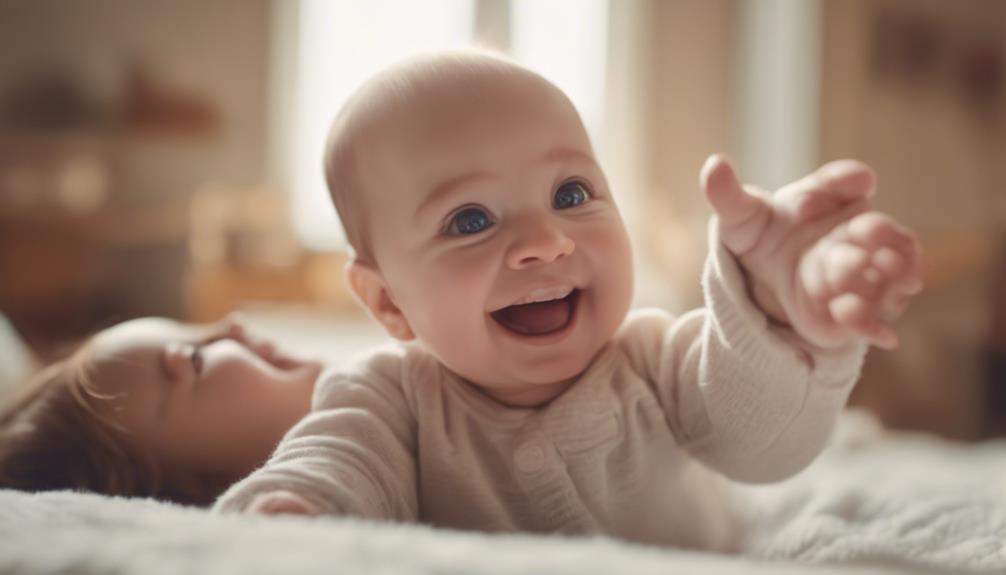
Developing social bonds with a 6-month-old baby involves fostering trust and security through consistent interactions and responsive caregiving. It's a critical stage in their social development where they begin to form attachments and learn to rely on familiar faces for comfort and support.
Here are some emotional aspects to ponder:
- Smiling back at your baby when they look at you helps build a sense of connection and reciprocity.
- Responding promptly to their cries or needs reinforces the idea that they can depend on you for comfort and care.
- Engaging in interactive activities like peek-a-boo or simple games can enhance the bond between you and your baby, fostering a sense of joy and security.
Encouraging Social Interaction
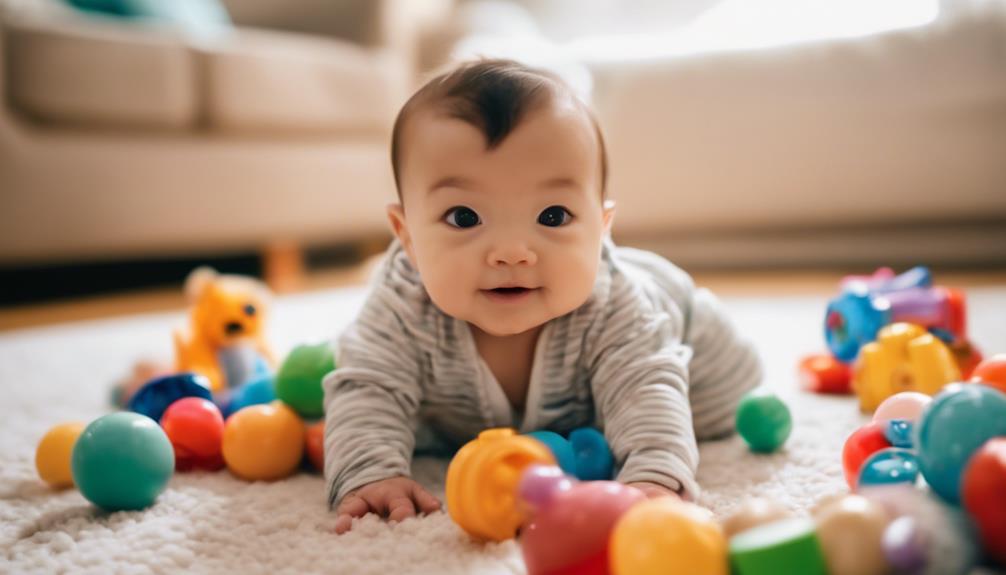
To encourage social interaction in a 6-month-old baby, engage in activities that promote bonding and communication. At this stage of your child's development, they're starting to recognize familiar faces and enjoy playing with others, displaying early social skills.
Interact with your baby through games like peek-a-boo, which can enhance their social engagement. Responding to your baby's sounds and gestures is important as they use these cues to communicate their needs and feelings. By acknowledging and reciprocating their sounds, you're validating their attempts at social interaction and fostering their communicative abilities.
Babies at 6 months old may express happiness or displeasure through sounds, signaling their growing capacity to engage socially. This form of communication is an essential aspect of your child's development, as it lays the foundation for understanding emotions and building relationships.
Frequently Asked Questions
What Are the Social Skills of a 6 Month Old?
As a 6-month-old, you start recognizing familiar faces, enjoying interactions like peek-a-boo. Responding to emotions, you show happiness with caregivers. Exploring mirrors, you show early signs of self-awareness. Expressing emotions through sounds, you lay the foundation for social skills.
What Are Social Emotional Milestones for a 6 Month Old?
You're about to discover the remarkable social and emotional milestones of a 6-month-old. From recognizing familiar faces to expressing joy through sounds, your baby's growing awareness and interactions with others are truly heartwarming.
What Is the Social and Emotional Development of a 6 9 Month Old Baby?
You'll notice your baby becoming more social at 6-9 months, recognizing familiar faces, enjoying playtime with family, and displaying a range of emotions. They might show curiosity and joy looking at themselves in a mirror and start mimicking expressions.
What Developmental Stage Is a 6 Month Old In?
You're currently in a critical developmental stage. At 6 months, recognizing familiar faces, enjoying play, and responding to emotions are common. Engage in activities like peek-a-boo and sweet talk to enhance social growth.
Conclusion
In summary, the social development of a 6-month-old baby is a fascinating process that involves forming attachments, expressing emotions, and interacting with caregivers and others.
While some may argue that babies this young are too young to develop meaningful social bonds, research has shown that infants are capable of forming strong connections and responding to social cues early on.
By engaging in interactive activities and providing a nurturing environment, you can help support your baby's social development during this critical stage of life.


